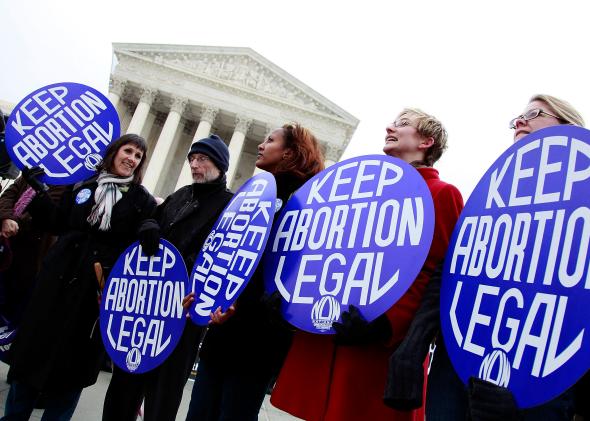The U.S. Supreme Court heard arguments today in two cases challenging Texas Senate Bill 8 (SB8), which has banned nearly all abortion in Texas since it took effect September 1. At stake is whether Texans will continue to have to travel to nearby states like Colorado for care, whether other conservative states will be emboldened to pass laws that mimic SB8, and the fate of the federal constitutional right to an abortion promised in Roe v. Wade.
Nearly all of the three hours of arguments in the Whole Woman’s Health v. Jackson and United States v. Texas cases today focused on SB8’s unique enforcement mechanism, which allows anyone from anywhere to sue abortion providers and anyone else who helps a person get an abortion after six weeks gestation, with a $10,000 reward for successful lawsuits.
Anti-abortion advocates hoped that in passing an abortion ban that deputizes private citizens as enforcers of the law rather than the state, they could shield their ban from judicial review, regardless of the constitutional issues at hand. So far, their hopes have been realized, and as a result, the court spent hours delving into highly technical issues around standing and civil procedure in determining whether it could block the law.
It was apparent from today’s arguments, however, that in addition to the court’s liberal justices, some conservative justices–namely, Brett Kavanaugh and Amy Coney Barrett–have concerns about this enforcement mechanism and its implications for the judicial system at large, not just when it comes to abortion law.
But while the court may very well rule that states cannot use the enforcement scheme crafted in SB8 to avoid judicial review, it does not appear to be acting in the interest of protecting the constitutional right to abortion and upholding Roe. The impact this law has had on Texans seeking abortion care and on abortion providers in Texas and in nearby states was hardly mentioned today, nor was the prospect of a future where states are allowed to trample reproductive rights with impunity.
“The fact that only Justice Sotomayor was bringing up the impact on people is very telling,” said Laura Chapin, communications consultant for the Colorado abortion advocacy organization Cobalt. “Laws are not abstract, they have real effects on real people.”
Meanwhile, the court is scheduled to hear arguments December 1 in the Dobbs v. Jackson Women’s Health Organization case, which concerns a Mississippi law that bans abortion at 15 weeks and presents yet another direct challenge to Roe. In the next few weeks alone, there are multiple avenues by which abortion rights could be weakened or undone entirely.
The impacts on Texans have been dire, and they also spell trouble for nearby states like Colorado that are regional hubs for abortion care.
Over the last two months since SB8 has been in effect, Colorado has seen a huge increase in Texas patients, putting pressure on abortion clinics and organizations that provide financial and practical assistance for people seeking abortion care. During September, a Planned Parenthood clinic in Denver saw over a 500% increase in patients from Texas.
Amanda Carlson, who runs the Cobalt Abortion Fund, said that since SB8 took effect, around a third of their clients have been Texans.
She said many patients are getting early flights into Colorado so they can have their procedures and hop on a plane home all in the same day, even if they’re post-sedation, in order to not miss work or get home to their kids.
“There’s a lot of confusion and stress, and seeking health care can already be confusing and stressful, especially care that is stigmatized,” Carlson said. “It’s truly heartbreaking what’s happening.”
Carlson said they’ve been helping their clients book last-minute hotel rooms and sending them cash directly to help pay for procedures and travel costs. But she says despite generous donations, they’re concerned they won’t be able to provide help for everyone who needs it, particularly if more states continue to restrict abortion access.
Carlson added that this new wave of Texas patients has Colorado abortion providers working overtime to meet the increase in demand for care and that clinics in the southern part of the state are booked out for weeks.
“People in those regions, Coloradans in those regions, are now having to travel,” Carlson said. “So it’s this domino effect, and I do fear we won’t be able to meet the need.”
What’s happened over the past two months indicates a future where states that neighbor those with abortion bans simply don’t have the resources to meet the needs of patients, including their own residents. That means people living in those regions could face potentially prohibitive travel costs to get an abortion, even if they live in a state like Colorado that doesn’t have many restrictions on abortion. SB8 alone, if it is allowed to stay in effect, may make it harder for Coloradans to get abortion care. If even more states are allowed to pass similar legislation or if the court overrules Roe entirely, bizarre enforcement schemes aside, it could lead to a dire capacity issue for nearly everyone in the U.S.
Even before SB8, many people traveled to Colorado for abortion care, particularly later in pregnancy after many states ban the procedure. A report released this month from the Guttmacher Institute, however, shows that if abortion is further restricted or banned as a result of a Supreme Court ruling, the number of women who could be forced to travel to Colorado for abortion would increase dramatically.

Twenty-six states are likely to ban abortion entirely in the absence of Roe, according to the Guttmacher Institute. If that happens, Colorado would see an increase of anywhere from 200,000 to 1.2 million women for whom Colorado is the closest place they can get care. Most of those women would come from Utah, Idaho, Wyoming, and Montana, all of which are likely to ban abortion. On average, women in Montana currently drive 22 miles one-way to get care. In the case of an abortion ban, they’d need to drive 384 miles one-way for an abortion.
In the case of a court ruling that allows for bans on abortions at 15 weeks–like the Mississippi law at issue in the upcoming Dobbs v. Jackson Women’s Health Organization case–Colorado and other so-called “destination” states would see similar numbers of women who would rely on them for care.
But all of this, of course, requires that people have the financial means to travel, which often means taking time off of work and arranging child care. Only then, in this picture of a post-Roe future, does a pregnant person have a shot at securing an abortion appointment, which could be a feat in and of itself.
“Roe is the floor, not the ceiling,” said Chapin. “Roe has never been enough in and of itself. We need to protect reproductive rights for everyone, including abortion. Up until now, we’ve assumed that the courts would protect us, and that’s clearly not the case anymore.”
On that note, Carlson urged Coloradans to contact their state representatives and ask them to support legislation that affirmatively protects the right to an abortion under Colorado state law. She also urged people to donate to abortion funds like Cobalt that are helping people afford care.




